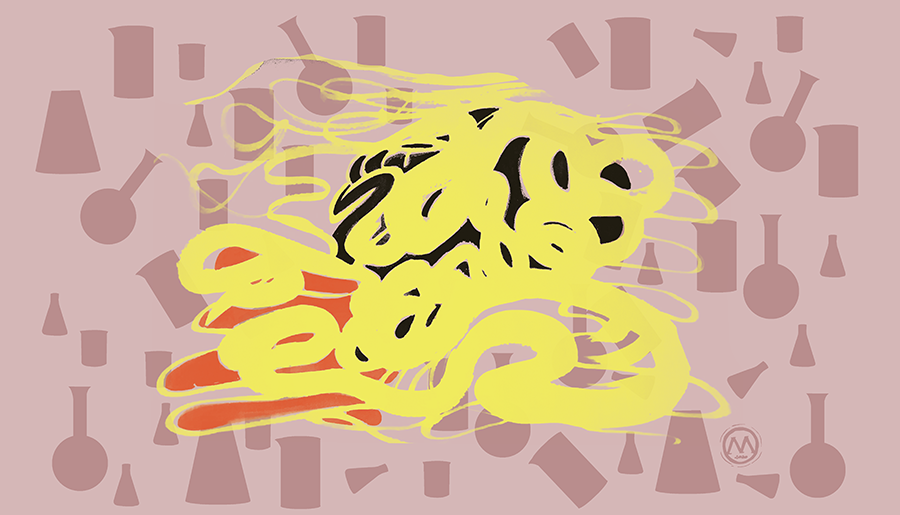How does brain chemistry affect emotions? Do you know?
None of us are born with all the skills needed to fully process the world around us. Our brains take years of development to grow, make new connections, and set patterns. In this way, we learn to communicate, be part of society, and improve our skills and talents. Our brain develops by creating neural pathways, which are connections between neurons through which electricity can flow.
In this article you will learn:
- How brain chemistry affects your emotions.
- About the basic neurotransmitters and what emotions are responsible for: dopamine, serotonin, acetylcholine, GABA.
- About the hormones that affect your mood: endorphins, oxytocin, and cortisol.
Our brain is not static, on the contrary, it is constantly changing. This enables us to consciously model neural pathways through neuroplasticity. Thanks to this, when we notice habits that do not serve us, we can replace them with new ones. But what causes the formation of such and no other paths in our brain? What are the motivations behind our actions? The answer lies in the chemistry of the brain.
You feel that all the decisions, feelings, and emotions you make are controlled by you. Meanwhile, at any moment in your brain, there are millions of different chemical reactions that are actually responsible for your mood and feelings. So, whatever seems to be under your control doesn’t really depend on you, but on your brain chemistry, and is influenced by a whole host of other factors.
Your brain produces electrical activity that results from chemical reactions in your brain.
When nerve cells want to communicate with each other, they have to release chemicals. In order for the electricity in your brain to jump synapses between neurons, the dendrites on one side must release chemicals that will reach the receptor on the other side. These substances are neurotransmitters or neurochemicals, which are chemicals whose molecules transfer signals between neurons through synapses, and from nerve cells to muscles or glands. Each of the neurosubstances has a complex shape that matches specific receptors. When you feel like you’re flooding with emotions, your brain has released more chemicals than your receptors can process. When the neurosubstance finds its receptor, an electric spark ignited by your neuron tells you where to look for happiness in the future.
Neurochemicals automatically make your brain learn, so the experiences that trigger your neurochemicals contribute to your autopilot.
Each substance triggers separate experiences that build separate neural pathways.
All neurotransmitters are present in every brain and fall into two basic categories:
- stimulating – that is, stimulating brain activity;
- inhibitory – that is, having a calming effect.
There are about 100 different neurotransmitters. However, according to Dr. Krzysztof Kupka, only 4 of them play a key role in our mental and emotional development. They are dopamine, acetylcholine, GABA, and serotonin. These 4 chemicals correspond to the four states of mind: awareness, behavior, mood, and cognition.
Dopamine – Pleasure
The pleasure molecule. It is associated with the pleasure and reward centers of the brain. It signals the expectation of a reward, the assumption that something good will happen to you. The molecule causes the joy of receiving the prize. Dopamine is also responsible for the motivation to act. “I can handle it!” The substance allows you to predict what reward awaits you for your behavior.
Dopamine is released when you experience pleasure. It makes you desire things, and it motivates you to act. This neurochemical is responsible for your joy in finding things that meet your needs. It motivates you to get what you need, even if it takes a lot of effort.
Thanks to it, you are balanced and rational. You are strong-willed and know exactly what you want and how you will get it. You are smart, confident, and rational. Thanks to it, you have the ease of strategic and rational thinking. You are focused and mindful. You value facts and figures more than feelings and emotions. You’re great at dealing with stress. You need less sleep and are tireless.
It plays a huge role in addiction. It affects your energy, arousal, and decision-making, as well as your sexual satisfaction. Thanks to it, you prioritize things depending on how much pleasure they bring to you. For example, you prefer to spend your time browsing social media instead of working or studying.
What makes it grow?
- Food
- Sex
- Cocaine
- Alcohol
- Methamphetamine
- Video games
- Browsing social media
- Watching TV
- Shopping
- Pornography
Too much dopamine causes impulsive behavior and a tendency to take risks. Your brain doesn’t care whether the amount of dopamine it produces is harming you or not. It just wants more and more of it. Dopamine makes you constantly check your phone, and expect a reward in the form of a message or notification.
Dopamine deficiency causes energy loss, chronic fatigue, impulsive behavior, procrastination, aggression, anger, guilt, lack of self-esteem, lack of resistance to stress, social isolation, procrastination, fatigue, indolence, and sadness.
Serotonin – Calm
It is released when you overcome fear and when it is safe to meet your needs. Then a sense of strength grows in you. It is responsible for high status, and the need for social bonds. Thanks to it, you can enjoy controlling your surroundings. It gives you confidence and a sense of pride. “I’m the best!”
This chemical is responsible for feelings of peace, rest and, sleep, but also sexual arousal and hunger. It also affects your appetite and learning. It produces a feeling of pride in being respected by others. Serotonin is responsible for a sense of security and inner comfort. It increases your reproductive capacity and protects your offspring. It raises the mood and reduces aggression. This substance makes you immune to depression and anxiety. Responsible for the mind-body connection. It makes you know how to enjoy life and live in the moment.
Too much of this neurotransmitter can make you extremely nervous, impulsive, indecisive, distracted, and sensitive to criticism. It can also cause morbid shyness and problems interacting with others.
A serotonin deficit can lead to fatigue, depression, and a feeling of loss of control. It impairs the ability of your brain to rest and regenerate, and thus lacks clarity of thinking. It causes sleep problems.
Acetylcholine – Intuition
This substance causes the senses to play a major role in your life. Thanks to this neurosubstance, you are very creative and open to new ideas. It causes you to be very intuitive, flexible, spontaneous, and innovative. You are sensitive, altruistic, romantic, and optimistic. You enjoy everything that is related to words, ideas, and communication. Thanks to it, you are optimistic about the world.
The excess of this neurotransmitter causes you to stop thinking about your needs and start falling into masochism. It is also associated with anxiety, panic, and manic attacks.
Deficiency in turn causes memory gaps, disturbances in the learning process, problems with attention and concentration, forgetfulness, mood swings, hyperactivity, changes in personality and language, and Alzheimer’s disease.
Gamma-Aminobutyric Acid (GABA) – Rest
A characteristic feature of this neurotransmitter is that it balances the brain waves. GABA makes you stable, composed, reliable, organized, constant, and outgoing. GABA makes you reliable, socially open, and caring. It causes you to stay calm despite the chaos and confusion.
What makes it grow?
- Alcohol,
- Valium.
Too much GABA causes a tendency to seek authority too often, seek the opinions of others, and follow their advice.
Deficiency, on the other hand, leads to fear, anxiety, impulsiveness, disorganization, emotional instability, nervousness, and irritation. And it also causes weakness and lethargy.
In addition to neurotransmitters, your behavior, mood, and feelings are also influenced by hormones, mainly:
Endorphins – Joy
Happiness hormones. They are responsible for the feeling of euphoria and relieving pain. They create forgetfulness that masks physical pain and reduces stress. Thanks to them, you avoid the risk of physical injury. Their production stimulates physical pain, but also laughter, crying, and sport. They are responsible for your well-being. They influence your sexual behavior.
Oxytocin – Love
The love hormone. It is responsible for the feeling of trust, the need to be in a group, in order to ensure protection against a possible threat. It is released during orgasm and also when a woman gives birth and then breastfeeds her baby to keep her offspring safe. The chemical also releases itself in the baby when it is in an embrace so that it does not move away from the mother and expose itself to dangers. It creates a sense of security and comfort in the company of another person. Thanks to it, you know when you can safely trust others. “I trust you!”
It is responsible for the sense of security with other people and intimacy. It makes you become attached to other people. Oxytocin is associated with motherly love, sex, and empathy. It is created during a handshake, hugging, touching, eye contact with another person, or having sex.
Cortisol – Anxiety
Stress hormone. A chemical that tells you about a hazard. So that you get evidence of the threat. It causes anxiety and fear.
So, it turns out that what you think is yourself, your thoughts, feelings, and behaviors are really physics, chemistry, and biology. Your feelings are unique, but the chemicals that cause them are the same for everyone. In order to understand yourself better, you should try to understand their principles of operation at least to a minimum, and understand how brain chemistry affects emotions. And then, richer in this knowledge, try to change in yourself what does not serve you, in order to become the best version of yourself.
Source:
Krzysztof Krupka “Neuroregulacja”, drkrupka.pl
Loretta Graziano Breuning „Habits of a Happy Brain”, Adams Media, 2016, New York
„How Brain Chemicals Influence Mood and Health„, 2016, share.upmc.com https://share.upmc.com/2016/09/about-brain-chemicals/


